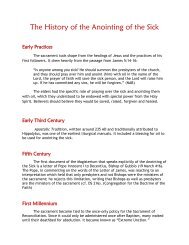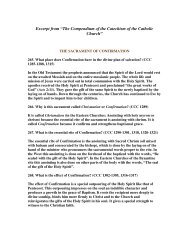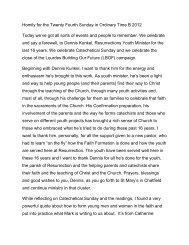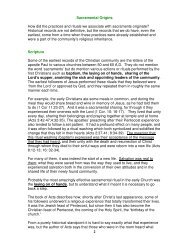Catechism of the Catholic Church IV. The Gravity of Sin: Mortal and ...
Catechism of the Catholic Church IV. The Gravity of Sin: Mortal and ...
Catechism of the Catholic Church IV. The Gravity of Sin: Mortal and ...
You also want an ePaper? Increase the reach of your titles
YUMPU automatically turns print PDFs into web optimized ePapers that Google loves.
<strong>Catechism</strong> <strong>of</strong> <strong>the</strong> <strong>Catholic</strong> <strong>Church</strong><br />
<strong>IV</strong>. <strong>The</strong> <strong>Gravity</strong> <strong>of</strong> <strong>Sin</strong>: <strong>Mortal</strong> <strong>and</strong> Venial <strong>Sin</strong><br />
1854<br />
1855<br />
<strong>Sin</strong>s are rightly evaluated according to <strong>the</strong>ir gravity. <strong>The</strong> distinction between<br />
mortal <strong>and</strong> venial sin, already evident in Scripture, 129 became part <strong>of</strong> <strong>the</strong> tradition<br />
<strong>of</strong> <strong>the</strong> <strong>Church</strong>. It is corroborated by human experience.<br />
<strong>Mortal</strong> sin destroys charity in <strong>the</strong> heart <strong>of</strong> man by a grave violation <strong>of</strong> God's law;<br />
it turns man away from God, who is his ultimate end <strong>and</strong> his beatitude, by<br />
preferring an inferior good to him.<br />
Venial sin allows charity to subsist, even though it <strong>of</strong>fends <strong>and</strong> wounds it.<br />
1856<br />
1857<br />
1858<br />
1859<br />
<strong>Mortal</strong> sin, by attacking <strong>the</strong> vital principle within us—that is, charity—<br />
necessitates a new initiative <strong>of</strong> God's mercy <strong>and</strong> a conversion <strong>of</strong> heart which is<br />
normally accomplished within <strong>the</strong> setting <strong>of</strong> <strong>the</strong> sacrament <strong>of</strong> reconciliation:<br />
When <strong>the</strong> will sets itself upon something that is <strong>of</strong> its nature incompatible with <strong>the</strong> charity that<br />
orients man toward his ultimate end, <strong>the</strong>n <strong>the</strong> sin is mortal by its very object . . . whe<strong>the</strong>r it<br />
contradicts <strong>the</strong> love <strong>of</strong> God, such as blasphemy or perjury, or <strong>the</strong> love <strong>of</strong> neighbor, such as<br />
homicide or adultery. . . . But when <strong>the</strong> sinner's will is set upon something that <strong>of</strong> its nature<br />
involves a disorder, but is not opposed to <strong>the</strong> love <strong>of</strong> God <strong>and</strong> neighbor, such as thoughtless<br />
chatter or immoderate laughter <strong>and</strong> <strong>the</strong> like, such sins are venial. 130<br />
For a sin to be mortal, three conditions must toge<strong>the</strong>r be met: "<strong>Mortal</strong> sin is sin<br />
whose object is grave matter <strong>and</strong> which is also committed with full knowledge<br />
<strong>and</strong> deliberate consent." 131<br />
Grave matter is specified by <strong>the</strong> Ten Comm<strong>and</strong>ments, corresponding to <strong>the</strong><br />
answer <strong>of</strong> Jesus to <strong>the</strong> rich young man: "Do not kill, Do not commit adultery, Do<br />
not steal, Do not bear false witness, Do not defraud, Honor your fa<strong>the</strong>r <strong>and</strong> your<br />
mo<strong>the</strong>r." 132 <strong>The</strong> gravity <strong>of</strong> sins is more or less great: murder is graver than <strong>the</strong>ft.<br />
One must also take into account who is wronged: violence against parents is in<br />
itself graver than violence against a stranger.<br />
<strong>Mortal</strong> sin requires full knowledge <strong>and</strong> complete consent. It presupposes<br />
knowledge <strong>of</strong> <strong>the</strong> sinful character <strong>of</strong> <strong>the</strong> act, <strong>of</strong> its opposition to God's law. It also<br />
implies a consent sufficiently deliberate to be a personal choice. Feigned<br />
ignorance <strong>and</strong> hardness <strong>of</strong> heart 133 do not diminish, but ra<strong>the</strong>r increase, <strong>the</strong><br />
voluntary character <strong>of</strong> a sin.
1860<br />
1861<br />
1862<br />
1863<br />
1864<br />
Unintentional ignorance can diminish or even remove <strong>the</strong> imputability <strong>of</strong> a grave<br />
<strong>of</strong>fense. But no one is deemed to be ignorant <strong>of</strong> <strong>the</strong> principles <strong>of</strong> <strong>the</strong> moral law,<br />
which are written in <strong>the</strong> conscience <strong>of</strong> every man. <strong>The</strong> promptings <strong>of</strong> feelings <strong>and</strong><br />
passions can also diminish <strong>the</strong> voluntary <strong>and</strong> free character <strong>of</strong> <strong>the</strong> <strong>of</strong>fense, as can<br />
external pressures or pathological disorders. <strong>Sin</strong> committed through malice, by<br />
deliberate choice <strong>of</strong> evil, is <strong>the</strong> gravest.<br />
<strong>Mortal</strong> sin is a radical possibility <strong>of</strong> human freedom, as is love itself. It results in<br />
<strong>the</strong> loss <strong>of</strong> charity <strong>and</strong> <strong>the</strong> privation <strong>of</strong> sanctifying grace, that is, <strong>of</strong> <strong>the</strong> state <strong>of</strong><br />
grace. If it is not redeemed by repentance <strong>and</strong> God's forgiveness, it causes<br />
exclusion from Christ's kingdom <strong>and</strong> <strong>the</strong> eternal death <strong>of</strong> hell, for our freedom has<br />
<strong>the</strong> power to make choices for ever, with no turning back. However, although we<br />
can judge that an act is in itself a grave <strong>of</strong>fense, we must entrust judgment <strong>of</strong><br />
persons to <strong>the</strong> justice <strong>and</strong> mercy <strong>of</strong> God.<br />
One commits venial sin when, in a less serious matter, he does not observe <strong>the</strong><br />
st<strong>and</strong>ard prescribed by <strong>the</strong> moral law, or when he disobeys <strong>the</strong> moral law in a<br />
grave matter, but without full knowledge or without complete consent.<br />
Venial sin weakens charity; it manifests a disordered affection for created goods;<br />
it impedes <strong>the</strong> soul's progress in <strong>the</strong> exercise <strong>of</strong> <strong>the</strong> virtues <strong>and</strong> <strong>the</strong> practice <strong>of</strong> <strong>the</strong><br />
moral good; it merits temporal punishment. Deliberate <strong>and</strong> unrepented venial sin<br />
disposes us little by little to commit mortal sin. However venial sin does not break<br />
<strong>the</strong> covenant with God. With God's grace it is humanly reparable. "Venial sin<br />
does not deprive <strong>the</strong> sinner <strong>of</strong> sanctifying grace, friendship with God, charity, <strong>and</strong><br />
consequently eternal happiness." 134<br />
While he is in <strong>the</strong> flesh, man cannot help but have at least some light sins. But do not despise <strong>the</strong>se<br />
sins which we call "light": if you take <strong>the</strong>m for light when you weigh <strong>the</strong>m, tremble when you<br />
count <strong>the</strong>m. A number <strong>of</strong> light objects makes a great mass; a number <strong>of</strong> drops fills a river; a<br />
number <strong>of</strong> grains makes a heap. What <strong>the</strong>n is our hope? Above all, confession. . . . 135<br />
"<strong>The</strong>refore I tell you, every sin <strong>and</strong> blasphemy will be forgiven men, but <strong>the</strong><br />
blasphemy against <strong>the</strong> Spirit will not be forgiven." 136 <strong>The</strong>re are no limits to <strong>the</strong><br />
mercy <strong>of</strong> God, but anyone who deliberately refuses to accept his mercy by<br />
repenting, rejects <strong>the</strong> forgiveness <strong>of</strong> his sins <strong>and</strong> <strong>the</strong> salvation <strong>of</strong>fered by <strong>the</strong> Holy<br />
Spirit. 137 Such hardness <strong>of</strong> heart can lead to final impenitence <strong>and</strong> eternal loss.









